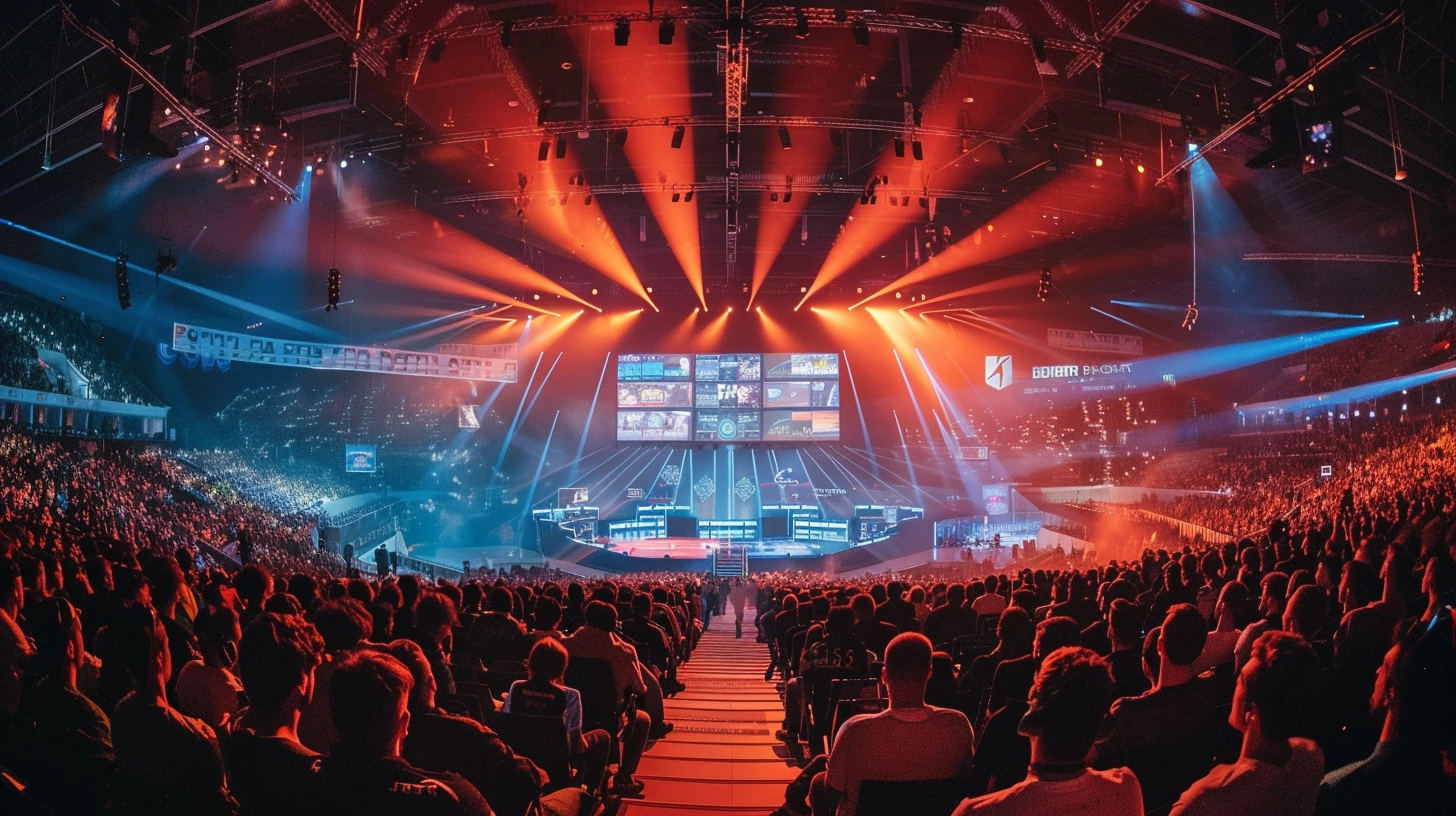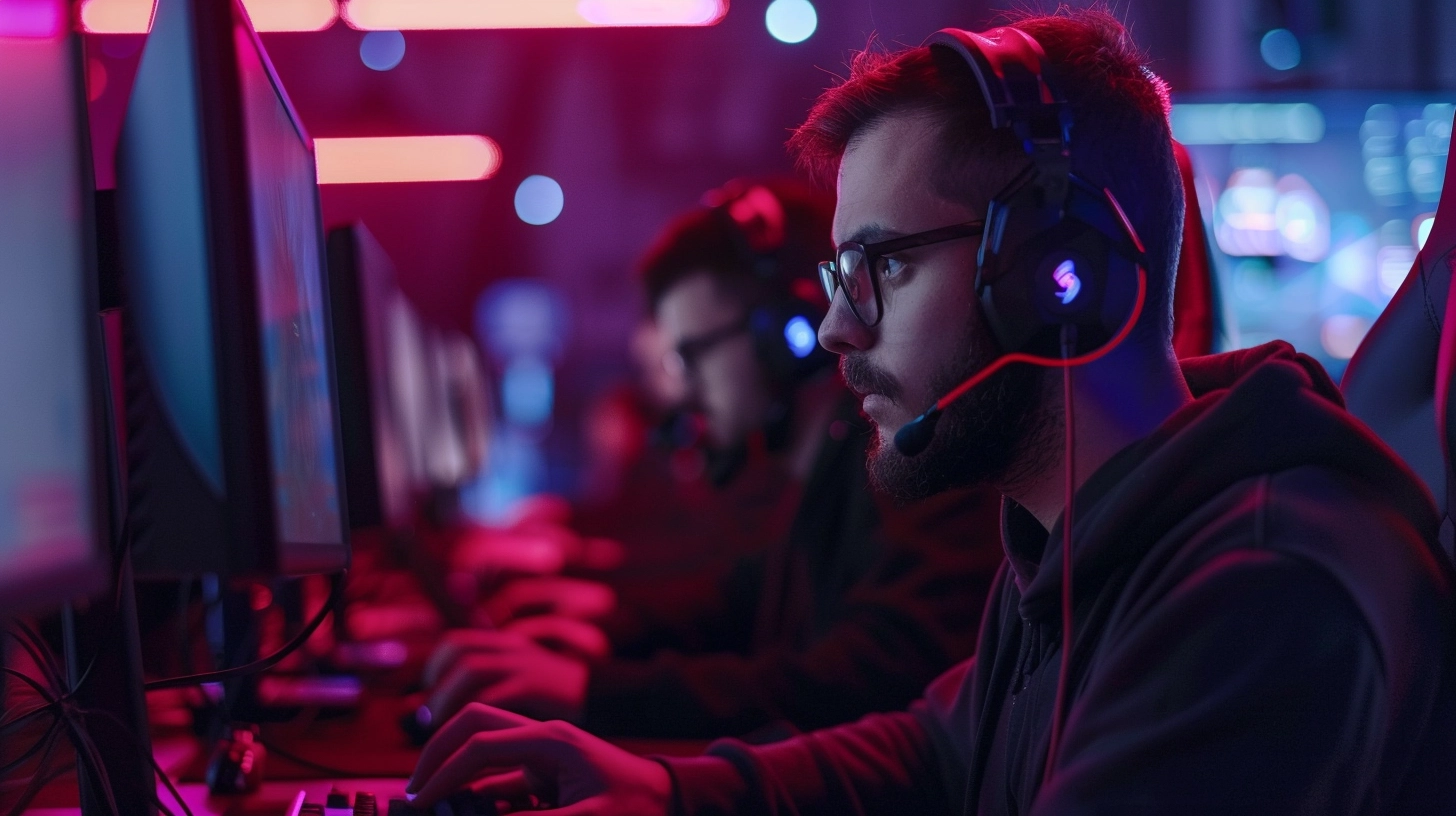The Rise of Esports in Bulgaria
The landscape of competitive sports has undergone a revolutionary transformation with the advent of esports, and Bulgaria is no exception. In recent years, this Balkan nation has emerged as a burgeoning hub for esports, drawing in players and spectators alike with its dynamic blend of technology, skill, and entertainment. This pace of development has also affected esports betting. Thus, any credit card online casino for UK players are operating in the country.

Historical Context
To fully grasp the current esports boom in Bulgaria, it's essential to delve into its roots, which trace back to the early 2000s. During this nascent stage, esports in Bulgaria were not the high-stakes, large-scale competitions we see today. Instead, they began humbly, in local internet cafes. These cafes were more than just gaming spots; they were the incubators of a new culture. Young Bulgarians, many of whom had limited access to gaming at home due to the high costs of computers and broadband connections, found a haven in these cafes. Here, they could immerse themselves in games like 'StarCraft' and 'Warcraft III', which were among the first to kindle the competitive spirit of esports in the country.
These internet cafes did more than just provide the hardware; they fostered a sense of community. Gamers congregated, exchanged tips, formed teams, and even organized informal tournaments. This era was critical in cultivating the skills of players and building a grassroots esports community. It's these early enthusiasts who would later become the first generation of professional gamers in Bulgaria.
This formative period also saw the emergence of small-scale, local tournaments, which slowly started gaining popularity. Although these events lacked the grandeur and scale of contemporary esports tournaments, they were fundamental in establishing a competitive esports environment in Bulgaria. They served as proving grounds for the country's most talented gamers, setting the stage for Bulgaria's ascent in the global esports arena.
The significance of these early years cannot be understated. They laid the groundwork for what would become a thriving esports ecosystem in Bulgaria, demonstrating the country's potential in the global esports landscape. As we look at the contemporary scene, these humble beginnings are a stark reminder of how far Bulgarian esports has come, evolving from local internet cafes to international stages.
Growth and Development
The significant surge in Bulgaria's esports scene became especially pronounced in the late 2010s, a period that could be considered the golden era for Bulgarian esports. This acceleration was fueled by several key factors, each contributing to the rapidly expanding popularity and legitimacy of esports in the country.
Firstly, increased internet accessibility played a pivotal role. The late 2010s witnessed a substantial improvement in Bulgaria's internet infrastructure, resulting in faster and more reliable internet connections. This technological advancement made online gaming more accessible and enjoyable, allowing a larger segment of the population to participate in and follow esports.
The rise of gaming cafes further catalyzed this growth. These modern cafes, equipped with high-end gaming PCs and consoles, became focal points for the gaming community, offering a shared space for both casual and competitive gamers. They served as venues for local tournaments and gatherings, creating a vibrant ecosystem where players could hone their skills and build networks.
Another critical factor was the growing affordability of gaming technology. With the global reduction in prices of gaming equipment and the increasing availability of cost-effective gaming PCs and peripherals, more individuals could set up their own gaming rigs at home. This democratization of gaming technology meant that esports was no longer an exclusive domain for those with high-end equipment.

The introduction of esports into educational institutions marked a significant milestone in the evolution of esports in Bulgaria. Schools and universities began recognizing esports as a valuable component of their curriculum, integrating it into their extracurricular activities. This not only helped in sharpening the students' strategic thinking and teamwork skills but also legitimized esports as a respectable and worthwhile pursuit.
Lastly, the Bulgarian Esports Federation's support was instrumental in this growth phase. Their efforts in organizing professional leagues, securing sponsorships, and providing a structured framework for competitions gave a significant boost to the esports scene. They worked tirelessly to promote esports across the country, advocating for its recognition as a legitimate form of sport and entertainment.
These combined factors led to a remarkable expansion in the esports sector in Bulgaria, with an increasing number of Bulgarian players participating in and excelling at international tournaments. This period marked a turning point, solidifying Bulgaria's place in the global esports landscape and setting the stage for future developments.
Major Games and Tournaments
In the heart of the Bulgarian esports revolution are several key games that have captivated both players and audiences alike, notably 'Counter-Strike: Global Offensive' (CS:GO), 'League of Legends', and 'Dota 2'. These games, with their complex strategies, intense gameplay, and engaging team dynamics, have not only attracted a massive following but have also become the centerpieces of Bulgaria's esports tournaments.
'Counter-Strike: Global Offensive' has been particularly influential in Bulgaria's esports landscape. Known for its fast-paced action and strategic depth, CS:GO has a dedicated fan base and a strong competitive scene in Bulgaria. Local teams have made a significant impact on the international stage, contributing to the game's popularity and inspiring a new generation of Bulgarian gamers.
'League of Legends', with its blend of real-time strategy, role-playing, and teamwork, has also gained immense popularity. Its appeal lies in the game's ever-evolving nature, with new content and strategies continually emerging, keeping the competitive scene fresh and engaging. Bulgarian teams and players have shown remarkable skill in this game, further boosting its status within the national esports community.
'Dota 2' completes this triumvirate of dominant esports games in Bulgaria. Even the 3D game development hurdles did not prevent the game from becoming one of the most popular in the world. Known for its intricate gameplay and strategic complexity, Dota 2 has a robust competitive scene in the country. The game's high skill ceiling and the depth of strategic possibilities have made it a staple in Bulgarian esports tournaments, drawing in both seasoned players and newcomers.
These games have been the focal points of major esports events in Bulgaria, like the 'PGL Major Sofia' and the 'ESL Southeast Europe Championship'. The 'PGL Major Sofia' has been a landmark event, not only showcasing the best of Bulgarian talent but also attracting top players from around the world. This tournament has significantly contributed to raising the profile of Bulgarian esports on an international level.
Similarly, the 'ESL Southeast Europe Championship' has been instrumental in highlighting the region's esports potential, with Bulgaria playing a central role. This event has provided a platform for local teams to compete against other top teams from the Southeast European region, fostering a sense of regional camaraderie and competition.
These games and tournaments have been more than just competitions; they've acted as catalysts for the growth of the Bulgarian esports scene, creating opportunities for players to develop their skills, gain international exposure, and elevate Bulgaria's standing in the global esports community. As these games continue to evolve and attract more players, the future of esports in Bulgaria looks brighter than ever.
Impact on Youth and Society
The impact of esports on the youth in Bulgaria is profound and multifaceted, offering new and exciting opportunities that extend well beyond the realm of gaming. As esports continues to grow in popularity, it's creating new pathways for social interaction, skill development, and professional careers, significantly influencing the younger generation.
One of the most noticeable impacts is in the realm of social interaction. Esports has emerged as a powerful platform for youth to connect, collaborate, and compete with peers sharing similar interests. This has fostered a sense of community among young gamers, breaking down social barriers and enabling friendships and teamwork. Online gaming and esports tournaments offer a virtual gathering place, where players from diverse backgrounds come together, united by their passion for gaming.

In terms of skill development, esports offers a unique blend of cognitive challenges and skill-building opportunities. Engaging in competitive gaming helps in honing strategic thinking, quick decision-making, and problem-solving abilities. Moreover, the teamwork required in many esports games develops communication and collaboration skills, which are valuable in both personal and professional contexts.
The rise of esports has also opened new career avenues for Bulgarian youth. Beyond becoming professional gamers, there are opportunities in related fields such as game development, event management, digital content creation, and esports journalism. This has led to an increased interest in STEM (Science, Technology, Engineering, and Mathematics) fields among students, aligning with the digital nature of esports.
Furthermore, the integration of esports into educational institutions in Bulgaria is a groundbreaking step. Schools and universities are increasingly recognizing the educational value of esports. By incorporating esports into their curriculum, these institutions are acknowledging its role in enhancing cognitive skills like strategic thinking and teamwork. This integration also helps in normalizing esports, presenting it as a valuable and constructive part of the educational experience.
This growing recognition has contributed to a significant shift in societal perception. Esports is increasingly being viewed as a legitimate form of competition and entertainment, similar to traditional sports. This shift is crucial for the long-term development and acceptance of esports, as it encourages more people to engage with and understand the esports ecosystem.
Overall, the impact of esports on Bulgarian youth and society is indicative of a broader cultural shift. As the line between digital and traditional forms of entertainment continues to blur, esports stands as a testament to the evolving landscape of competitive sports and its capacity to bring together technology, skill, and community in an engaging and educational manner.
Economic Implications
The burgeoning esports scene in Bulgaria has catalyzed significant economic growth, impacting various sectors and opening up new revenue streams. This digital revolution has not only enhanced the gaming industry but has also positively influenced other related fields.
One of the primary sectors benefiting from this growth is game development. The increasing popularity of esports has fueled demand for new and engaging gaming content. This, in turn, has led to the rise of both indie and larger game development studios in Bulgaria. These studios are not only contributing to the local economy through job creation but are also putting Bulgaria on the global map as a hub for innovative and creative game design, which does not require additional advertising.
Event management is another sector that has seen considerable growth due to esports. Organizing esports tournaments requires meticulous planning, logistics, and execution. This has led to the development of specialized event management companies in Bulgaria, focusing specifically on esports events. These companies manage everything from venue selection and setup to live streaming and audience engagement. The growth in this sector has created numerous jobs and business opportunities, contributing to the local economy.
Digital broadcasting and media coverage of esports events have also experienced a boom. With the increase in esports tournaments, there's a growing demand for live streaming services, commentary, and analysis. This demand has given rise to a new niche in digital broadcasting, catering specifically to esports audiences. It has also opened opportunities for content creators, commentators, and analysts, creating a vibrant ecosystem around esports media.
The influx of international esports tournaments in Bulgaria has had a ripple effect on the tourism and hospitality sectors. Such events attract players, teams, and fans from around the world, leading to increased occupancy in hotels, higher patronage in restaurants, and overall growth in tourism-related activities. This influx not only boosts the local economy but also enhances Bulgaria's reputation as an attractive destination for international events. A special mention should be made of various education and training courses, such as assistance to those addicted to gambling and gambling in particular.
Moreover, the rise of esports has indirectly stimulated the technology sector, particularly in areas like high-speed internet services, gaming hardware, and accessories. As more people engage in gaming and esports, the demand for high-performance gaming equipment and faster internet connections increases, driving growth in these sectors.
Challenges and Future Outlook
The impressive trajectory of the Bulgarian esports industry, while remarkable, is not without its hurdles. These challenges must be addressed to ensure the sustainable growth and global competitiveness of the industry.
One of the primary challenges is the need for more significant investment. While there has been notable progress, the Bulgarian esports scene still lags behind its European counterparts in terms of financial backing. Increased investment is crucial for improving the quality of tournaments, offering better prize pools, and providing more professional opportunities for gamers. This can come from a variety of sources, including corporate sponsorships, government funding, and private investments.
Infrastructure also poses a significant challenge. For esports to continue its growth trajectory, Bulgaria needs state-of-the-art gaming facilities, training centers, and venues equipped to host large-scale international events. Such infrastructure is essential not only for hosting major tournaments but also for training the next generation of esports talent. Improved infrastructure will also enhance the spectator experience, crucial for growing the fan base.
Another hurdle is the need for broader societal acceptance. Despite growing popularity, esports often struggles with recognition as a legitimate sport and career path. Overcoming this perception barrier requires educational efforts to showcase the skill, dedication, and opportunities within esports. Increased media coverage, public events, and endorsements from prominent figures could help in enhancing the public perception of esports.
Looking to the future, the potential for growth in the Bulgarian esports industry is immense. With the right blend of support from government bodies, educational institutions, and private investors, Bulgaria could significantly elevate its position in the global esports landscape. Government bodies can play a pivotal role by recognizing esports as an official sport, which can open up opportunities for funding, training programs, and integration into school curriculums. Educational institutions can contribute by incorporating esports into their programs, recognizing its value in developing critical thinking, teamwork, and technological skills.
Private investors and corporate sponsors are equally important in this equation. Their financial support and engagement can drive the industry forward, making it possible to host larger tournaments, develop better gaming infrastructures, and offer more professional opportunities to players.
Conclusion
The rise of esports in Bulgaria is a testament to the country's adaptability and enthusiasm for digital innovation. As it continues to evolve, it holds the promise of putting Bulgaria on the global esports map, not just as participants, but as leaders in this digital revolution.


 David from Pixabay
David from Pixabay















